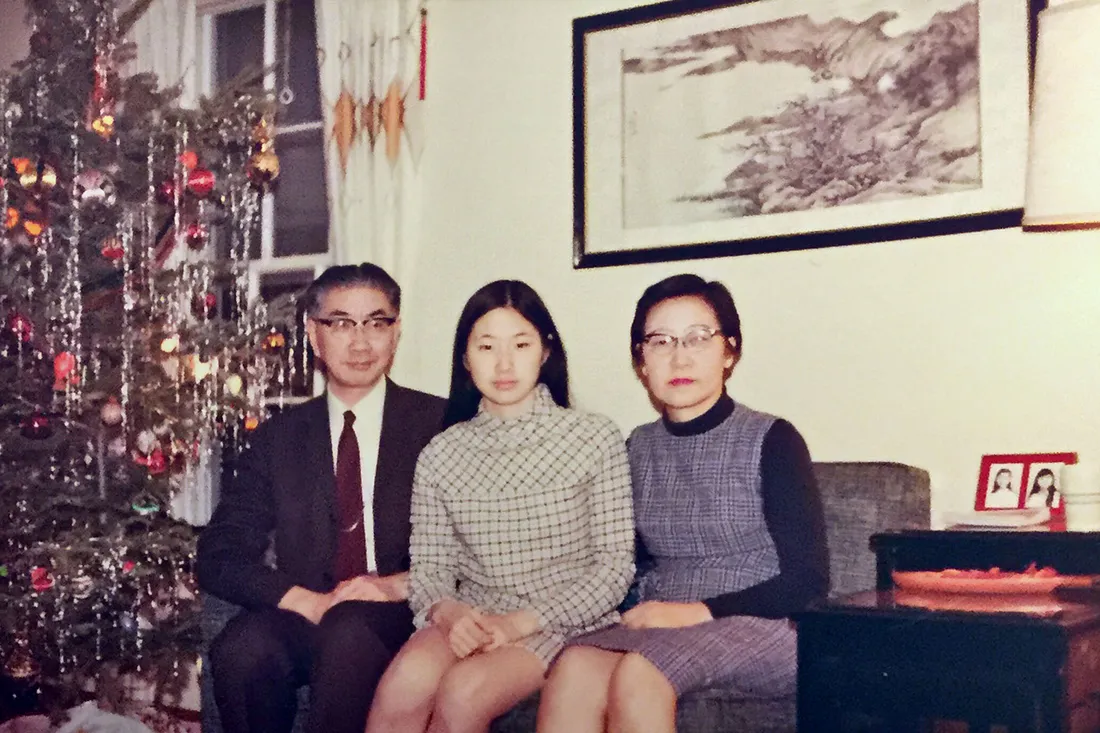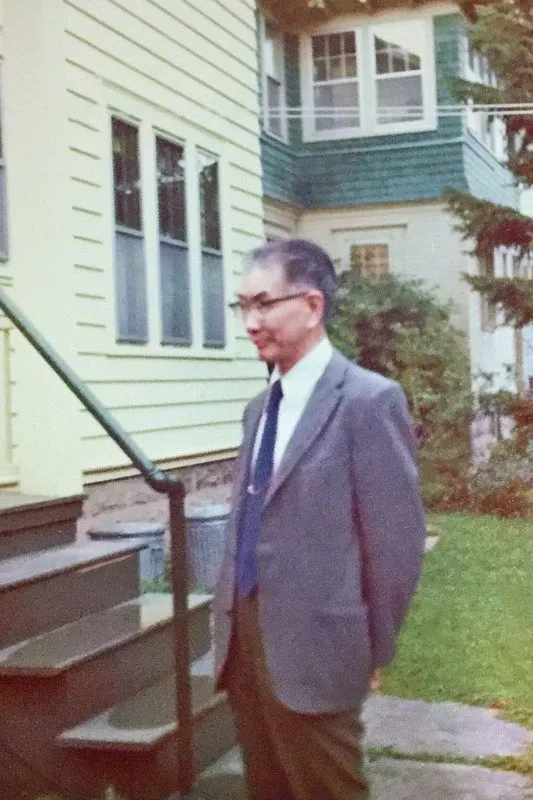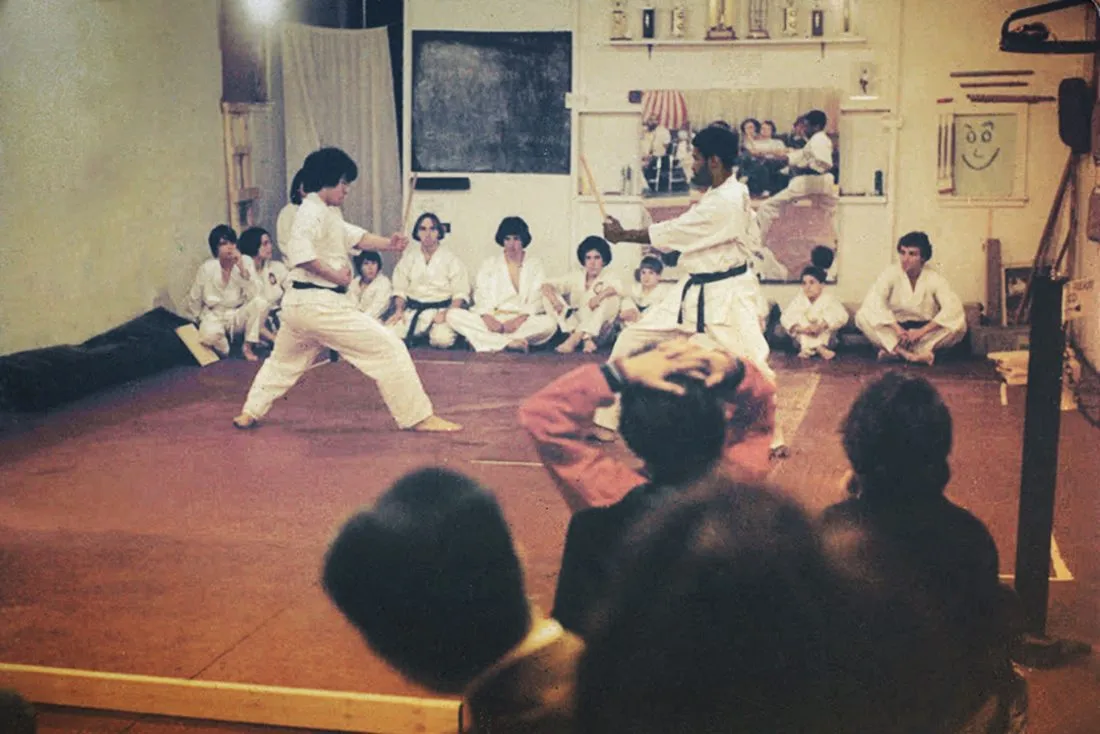
Professors Yueh-Ying, Ming-Kuei Hu are sitting with their daughter Linda Hu in 1971. In 1951, Yueh-Ying was the first woman appointed as a faculty member at Syracuse University’s College of Engineering and Computer Science. Her husband Ming-Kuei was hired by the University a month later.
The first female faculty member at Syracuse University’s College of Engineering and Computer Science (ECS), Yueh-Ying Hu, was appointed as an assistant professor of electrical engineering in September 1951. A month later, the college hired her husband, Ming-Kuei Hu, as an assistant research professor. Having two Dr. Hus proved something of a challenge at first, explains their former student Larry Browning ’75, now a physics professor at South Dakota State University. “There was always some confusion about which one you meant because they were both Dr. Hu,” he says. However, there is no mistaking the incredible impact Yueh-Ying and Ming-Kuei had individually and collectively on the lives of Syracuse University students, even decades later.
Yueh-Ying Helps Students Realize Their Potential
Born in Nanking, China, in 1918, Yueh-Ying was encouraged to be a scholar at an early age. “My father, who was a book merchant, always wanted me to study physics,” she told Syracuse’s Herald American in 1955, “but left the decision entirely up to me.” Her father’s support led to an interest in mathematics and eventually a bachelor’s degree in electrical engineering from the National Central University in China, where she met Ming-Kuei, a fellow electrical engineering student. They married and together earned master’s degrees from National Central University in 1944. Yueh-Ying was an instructor in China until 1947, when the Hus moved to Corvallis, Oregon. There, Yueh-Ying and Ming-Kuei earned doctoral degrees in electrical engineering from Oregon State College (now Oregon State University) in 1951. Yueh-Ying was a dedicated teacher that was invested in the success of every student. She told the Syracuse Herald American about her approach to teaching in 1955, “A teacher must be vitally interested in the student, encouraging and helping him to develop their full potential.”
Shiu-Kai Chin ’75, a professor of electrical engineering at ECS, earned his undergraduate degree at Syracuse University and was Browning’s roommate for three years. Chin met Yueh-Ying during his first month on campus—even before he was a student in her class—when he devoted much of his time to studying in an empty conference room at ECS. Late one Friday night, with the building practically empty, Yueh-Ying poked her head into the room and welcomed Chin to campus. “What was remarkable is she was still there working on something, and she took the time to welcome me. I was not invisible to her,” he says. The interaction was profoundly important to Chin. “I did nothing to merit her attention, other than studying, and I was not even in her class yet,” Chin says. “This story embodies why I love Syracuse University.”
When Chin was a student in the early 1970s, the campus didn’t have the large international and Asian American student body that exists today. Chin, a first-generation American citizen, identified with Yueh-Ying immediately. The fact that she was a female professor in a male-dominated field didn’t strike him as out of the ordinary. Chin’s mother had emigrated from Hong Kong and was trained as a civil engineer. “For me, that's why this place felt like home,” Chin says. “I would see Mrs. Hu every day—she's a scholar, she is the authority. I wanted to be like her.”
Her interest and encouragement helped many students believe in themselves. “Mrs. Hu was one of my favorite teachers and inspired me to learn and continue with academics,” says Browning. “My parents were visiting for graduation. Mrs. Hu went up to them and said, ‘Larry is one of these people who should go on and get a Ph.D.,’” he recalls. “They told me that later, and then I thought, ‘Well if Mrs. Hu thinks I can do that, I think I probably can.’”
Ming-Kuei’s Technological Foresight

Dr. Ming-Kuei Hu taught the first microprocessor courses at Syracuse University. His expertise helped guide the intellectual development of Syracuse University’s computer engineering program.
Ming-Kuei, though the quieter half of the couple, made no less of an impact. “He was very knowledgeable about computers when they were in their infancy,” says Browning. Ming-Kuei was promoted to associate professor in 1960 and to full professor in 1963. Despite his reserved nature, he helped guide the intellectual development of Syracuse University’s computer engineering program , only the second accredited program of its kind in the United States. He was the first professor to teach microprocessor courses at Syracuse University.
Chin credits Ming-Kuei for instilling an appreciation of theoretical components that gave him an edge compared to electrical engineers who hadn’t studied computers. After graduating in 1975, Chin went on to work at General Electric, where he was one of the very few computer engineers on staff. “I knew I would find out how well my education stacked up against everybody else's from all over the country,” he says. “And let me just say, it stacked up very well.” As advances in microelectronics ushered in the PC era from the mid-1970s through the 1980s, Chin says Syracuse University’s program correctly anticipated many of the technical revolutions that followed. “I place credit squarely on the shoulders of the faculty of the department, and Mr. Hu was certainly instrumental,” he says. “Syracuse University struck the right balance between theory and practice.”
Much like his connection with Yueh-Ying, Chin’s relationship with Ming-Kuei’s was exemplified by what happened outside of the classroom. Recalling Ming-Kuei’s engagement with students, Chin produces a photo of himself practicing karate in graduate school. The back of a man’s head is visible in the foreground. “That's Mr. Hu. He came to the dojo to see what I was doing,” Chin says. He keeps the photo in his office to ground himself. “It reminds me of my roots, not only as a Syracuse alumnus but as a faculty member.”

Dr. Shiu-Kai Chin (left) was a graduate student when Dr. Ming-Kuei Hu (foreground, left) came to the dojo to see Chin in action. “I keep this picture because that's him,” says Chin.
Parting Gifts
Yueh-Ying remained on the ECS faculty for her entire career, except during 1957-59, when she was acting chair of the University’s graduate center in Rome, New York, and in 1970-71, when she served as a visiting professor in the mathematics department. While at Syracuse, she and Ming-Kuei were members of the Institute of Radio Engineers, the American Institute of Electrical and Electronics Engineers, Pi Mu Epsilon and Sigma Xi. They were also active members of a club for Chinese students, which had 61 members in 1967. Today, Syracuse University’s Chinese Students and Scholars Association has more than 1,300 members.
In 1977, Yueh-Ying was diagnosed with terminal cancer. Browning and Chin were devastated. Browning, then a graduate student at Purdue University, wrote to tell Yueh-Ying how important she'd been to him, and that the way she'd lived her life was an inspiration to many at Syracuse University. Chin visited the hospital and found that, even at this difficult time, Yueh-Ying and Ming-Kuei made him feel welcome and appreciated. The visit exemplified the deep connection the Hus built with their students. “That's how giving they were,” Chin explains. “I think they knew how it would affect us, and so they granted us one final gift.”
Yueh-Ying died in April 1978. “She was very meaningful to me as a teacher, mentor and inspiration for what I did later in my life,” says Browning. “I certainly felt she played a critical role in my decisions. I think I made some good choices based on her example.” A fund was established in her honor, and at the 1979 ECS Convocation the first Yueh-Ying Hu Memorial Award was presented to Bonnie May Milliman. The award is given annually to a senior woman in ECS who best exemplifies the spirit, determination and academic excellence demonstrated by Yueh-Ying.
Ming-Kuei remained a professor at ECS until his retirement in 1986. During his tenure, he worked to establish connections between Syracuse University and the People’s Republic of China. In 1980, he was appointed an honorary professor at National Central University, which was renamed Nanjing Institute of Technology. He passed away in April 2002 at the age of 83.
The Hus’ Legacy
Today, the Hus’ impact on Syracuse University is evident, and their former students still feel a deep connection. “They were beacons of decency and all that's good,” Chin says. “I really can't say enough.”
Recently another former student, ECS alumnus Kwang G. Tan G’73, Ph.D., made two transformational gifts to Syracuse University. In 2017, he gave $3.5 million to support students with comprehensive health, wellness and recreation services at the Barnes Center at The Arch . Then in 2019 he gave $5 million toward the first-of-its-kind National Veterans Resource Center (NVRC) at the Daniel and Gayle D’Aniello Building. Tan has always been grateful for his academic experience at Syracuse University that led to his professional success.
Though the Hus never tried to draw a spotlight on themselves, their forward-thinking, ideals and mentorship continue to serve as inspiration at Syracuse University.
